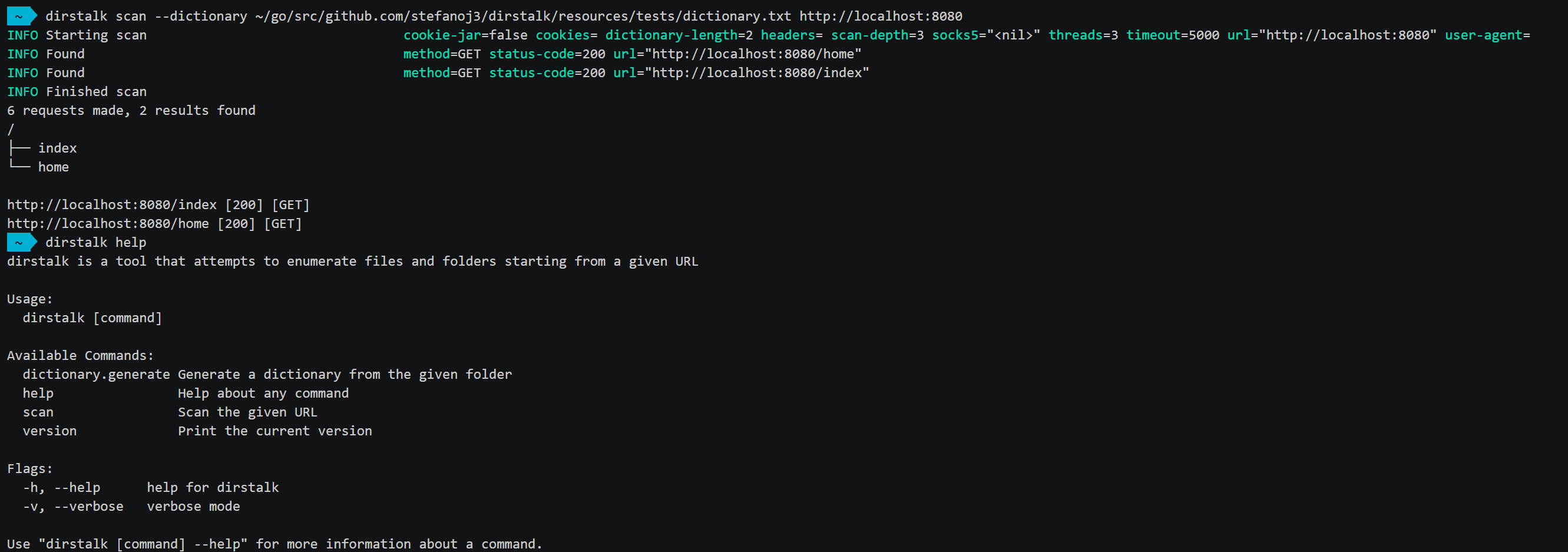
Dirstalk
Dirstalk is a multi-threaded application designed to brute force paths on web servers.
The tool contains functionalities similar to the ones offered by dirbuster and dirb.
Changelog v1.3.3
- No changes, only updated tooling and adding binaries for more architectures.
Download
Use
The application is self-documenting, launching dirstalk -h will return all the available commands with a short description, you can get the help for each command by doing distalk <command> -h.
EG dirstalk result.diff -h
Scan
To perform a scan you need to provide at least a dictionary and a URL:
dirstalk scan http://someaddress.url/ --dictionary mydictionary.txt
As mentioned before, to see all the flags available for the scan command you can just call the command with the -h flag:
dirstalk scan -h
Example of how you can customize a scan:
dirstalk scan http://someaddress.url/ \
--dictionary mydictionary.txt \
--http-methods GET,POST \
--http-timeout 10000 \
--scan-depth 10 \
--threads 10 \
--socks5 127.0.0.1:9150 \
--cookie name=value \
--use-cookie-jar \
--user-agent my_user_agent \
--header "Authorization: Bearer 123"
Currently available flags:
–cookie stringArray cookie to add to each request; eg name=value (can be specified multiple times)
-d, –dictionary string dictionary to use for the scan (path to local file or remote url)
–header stringArray header to add to each request; eg name=value (can be specified multiple times)
-h, –help help for scan
–http-cache-requests cache requests to avoid performing the same request multiple times within the same scan (EG if the server reply with the same redirect location multiple times, dirstalk will follow it only once) (default true)
–http-methods strings comma separated list of http methods to use; eg: GET,POST,PUT (default [GET])
–http-statuses-to-ignore ints comma separated list of http statuses to ignore when showing and processing results; eg: 404,301 (default [404])
–http-timeout int timeout in milliseconds (default 5000)
–out string path where to store result output
–scan-depth int scan depth (default 3)
–socks5 string socks5 host to use
-t, –threads int amount of threads for concurrent requests (default 3)
–use-cookie-jar enables the use of a cookie jar: it will retain any cookie sent from the server and send them for the following requests
–user-agent string user agent to use for http requests
Useful resources
- here you can find dictionaries that can be used with dirstalk
- tordock is a containerized Tor SOCKS5 that you can use easily with dirstalk (just docker run -d -p 127.0.0.1:9150:9150 stefanoj3/tordock:latest and then when launching a scan specify the following flag: –socks5 127.0.0.1:9150)
Dictionary generator
Dirstalk can also produce it’s own dictionaries, useful for example if you want to check if a specific set of files is available on a given web server.
Example:
dirstalk dictionary.generate /path/to/local/files --out mydictionary.txt
The result will be printed to the stdout if no out flag is specified.
Demo
Copyright (c) 2018-2019 Stefano Gabryel
Source: https://github.com/stefanoj3/